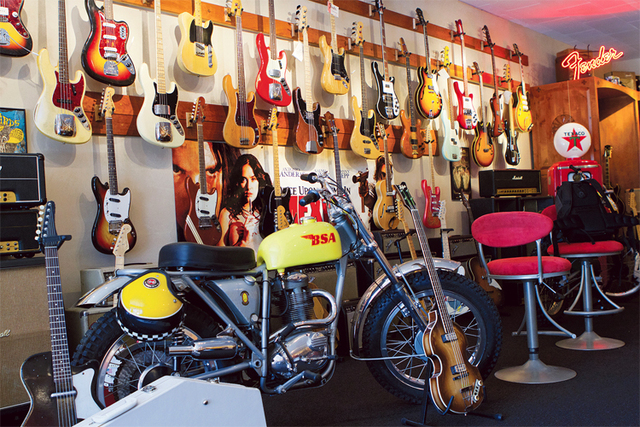Eliot Michael says “cool” more than most people. He’s got a shaggy rocker haircut (tousled, fringed around the neck and ears) and wears clothes that might have been salvaged from a Brooklyn basement Goodwill, except the fabric looks like it was tailored in a European atelier. He’s one of those people you feel like you should recognize, but you just can’t quite place it. That last feeling is heightened as Michael lounges in his new Rumble Seat Music showroom, surrounded by a sampling of the most hotly coveted vintage instruments, gear and motorcycles in the world.“It’s a museum,” he says with a smile. “But one that you can come in and play.”It’s not the most likely spot for such a prominent collector to settle into—his showroom is in one of those anonymous commercial strips in Upper Nob Hill. Neighbors include tattoo parlors, hookah stores, tarot readers and the city’s oldest gay club. Some high-nosed types might deem it unsavory. “I like the young vibe that’s going on in this area. It reminds me of New York City in the ’70s, ’80s. It just has that cool vibe, that energy, and it seems like it’s really building too. I just think this area’s great.”Collecting instruments (“the hunt,” as Michael calls it) has been his passion since he was a kid in Brooklyn.“I had a ’59 Les Paul when I was about 14, which is like the Holy Grail of guitars. It was my brother’s friend who had it. I had to kind of beg my parents and promise them my life, for the rest of my life, so they’d lend me the $300.”Michael’s love of music grew into a serious vocation, then a lifestyle. He left home at 16 to play professionally and joined Wayne County and the Electric Chairs—an iconic, internationally touring glam-rock band that played home gigs in all the classic New York rock clubs, with top billing alongside the likes of the New York Dolls. But the excesses of rockstardom carried dark repercussions, as many survivors can attest. After 20 years in its midst, a sober Michael emerged from rehab in Ithaca to start his life over.“I started out in the early days doing everything—garage-sale stuff, records, anything I could do to make a dollar, basically.” A brief stint in construction work went nowhere. “I started to feel like, If I’m going to be stuck doing this, I’d rather be dead. So I started buying and selling guitars out of the trunk of my car, and it built into this situation.”According to Michael, his success stems from a longstanding passion for classic gear and good rapport with circles of expert traders. Both elements naturally gained momentum over the years. Today, he no longer has to chase after amazing finds. He fields international calls from collectors looking to unload their treasures, jets off on buying trips all over the world and occasionally helps walk celebrity customers through the purchasing process. But Michael says whether you’re a famous guitar fiend from London or L.A. (a sampling of customers: members of Cheap Trick, The Rolling Stones, U2, Guy Pearce, Kiefer Sutherland) or an up-and-coming musician from Albuquerque, you’re going to get the same service from him and his staff. He also argues that it’ll be a better bargain than buying new from other dealers.“You buy a new guitar and you pay $2,000, then decide you don’t like it. They’ll give you a thousand bucks in trade, or less—which in my view, I think is fucked up. It’s not a good concept of business,” he says. “Here, you walk out with a guitar you like, and later if you want an upgrade, you can trade it back and you don’t lose all that money.”Michael says he enjoys watching the slack-jawed reactions of people who wander in off the street, expecting rickety salvageable equipment and a drowsy shopkeeper. Stacked along the room’s periphery are massive classic Marshall amps, all in custom colors (royal blue, fire engine red) and in mint condition, purchased from the largest private vintage collection in Italy. Since he doesn’t saddle up any more (“I hit a tree once,” he says, pointing to a ’72 Husqvarna like Steve McQueen used to ride), he decided that customers would at least appreciate the sight of the vintage motorcycles he’s amassed over the years. Arrayed around the room, their high shine and sleek lines complement the bodies and colors of the guitars encrusting the walls.“Some guitars are just sexy looking,” he says, gesturing toward a cherry-and-cream dreamboat. He swivels to point to a tall glass case. “There’s a ’59 Les Paul over there. … It’s been played, it’s got that whole magic about it—super cool.”The shop is packed with equipment just five months after opening its doors, and there’s still a warehouse full of inventory waiting in the wings. Michael says he’s ready to sign paperwork to take over the adjacent space, demo some walls and unveil even more of his collection. “In other places—all kinds of stores—there’s no soul, no care, no love in it,” he says. Another aspect of this labor of love, he adds, is encouraging arts industry friends and customers to visit the shop, to book a tour stop in Albuquerque, to personally experience the “cool vibe” of the area. He says he hopes to draw attention and support to the city’s music and arts scene. “The community deserves it,” he says, “and I think a lot of people here don’t believe in it.” After all, it was the scrappy, creative character of this place that lured him in during a trip six years ago with his wife. As soon as they stepped out of the airport, Michael says he found himself ruminating: “Whoa, this place feels right. It feels like home.”
Rumble Seat Music Southwest
4011 Central NE
717-2891,
rumbleseatmusicsouthwest.comHours: 10 a.m. to 6 p.m., Tuesday through Saturday; closed Sunday and Monday












